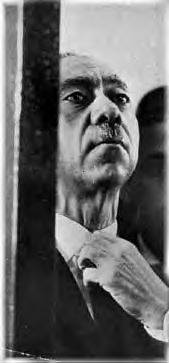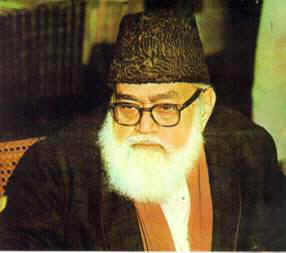Who Is the True Godfather of Islamic Fundamentalism?
31 Jul, 2007
Analysts and
commentators on Islamism often point to two individuals as the
"godfathers of Islamism" -
Sayyid Qutb and
Syed Abul Ala Maududi.
It is true that the writings of these two men have been influential
upon senior figures in the Islamist and Al Qaeda movements. Sayyid
Qutb (1906 - 1966) was spiritual leader of the Muslim Brotherhood
from the early 1950s until he was executed by the government of
Qutb and
Syed Abul Ala Maududi.
It is true that the writings of these two men have been influential
upon senior figures in the Islamist and Al Qaeda movements. Sayyid
Qutb (1906 - 1966) was spiritual leader of the Muslim Brotherhood
from the early 1950s until he was executed by the government of
Syed Abul Ala
Maududi was born in
 at
a Deobandi seminary in
at
a Deobandi seminary in
The offshoots of
Jamaat-e-Islami in
Pakistan and
Bangladesh have enacted
severe persecutions of the Ahmadiyyah. As a result of pressure from
J-e-I in
Maududi and Qutb
both supported the notion that it was every Muslim's duty to work
towards the establishment of Islam on earth as a global political
entity. The two groups to which these ideologues had belonged, the
Jamaat-e-Islami and the Egyptian Muslim Brotherhood, maintained
close links. Both groups
have been involved in violence and sponsorship of terrorism. When
East Pakistan seceded from West Pakistan, leading to the formation
of
The other global
fundamentalist Islamic movement, spread from
The ideologies of
these three individuals - Muhammad Ibn Abd al-Wahhab, Sayyid Qutb
and Syed Abul Ala Maududi (or for easier remembering Wahhab, Qutb
and Maududi) - are central to the Islamist and terrorist movements
which are now plaguing both the Muslim and non-Muslim world. Yet
these individuals in turn were influenced by one man who is
virtually unknown to most Westerners.
His name is Ibn
Taymiyyah, or Taq ad-Din Ahmad ibn Taymiyyah, and he lived from 1263
to 1328. His name by birth was Ahmad ibn Abdul-Halim ibn Abdas-Salaam.
This individual could be considered as the real godfather of
fundamentalism. Maududi borrowed extensively from Taymiyyah's
writings.
Ibn Taymiyyah
lived in a time of great upheaval in the Muslim world. In the West,
the Crusades were still being waged at the time of his birth, ending
with the Ninth Crusade of 1271 to 1272. In the East, Mongols from
the Steppes had flooded to conquer the towns and cities along the
Ibn Taymiyyah was
born in Harran, in what is now
Taymiyyah
preached extensively, and made numerous fatwas. He broke with
tradition by declaring the Mongols, who had converted to Islam, to
be heretics because they followed
man-made laws, rather than Sharia. To denounce
any individual or group, particularly a ruler, as a heretic (takfir)
was a role previously confined to a select few, such as the
Assassins. Taymiyyah
declared that the Islamized Mongols were living in "Jahiliyah", the
state of ignorance that existed before Mohammed. He also argued that
Muslims should not follow such rulers, and it was their duty to kill
such people. Centuries later, Maududi would write of non-orthodox
Muslims living in jahiliyah. Taymiyyah also denounced the
worship at shrines, a concept echoed later by ibn Wahhab who also
wrote in his book Kitab al-Tawhid (Chapter
36) that that no-one should obey a scholar or
ruler if that person contradicts the Qur'an or the Sunnah (actions
of the Prophet) in any way.
In 1300, while
the Mongols (Tartars) were besieging
Taymiyyah's fatwa
against the Mongols, declaring them to be infidels,
also
made mention of a
perpetual jihad: "There will always remain a group of people from my
nation who establish the truth. They will never be agonised by those
who let them down nor by those who disagree with them till the day
of judgment." The fatwa, issued in 1303, was followed by a
battle which took place
between Taymiyyah's "authentic" Muslims and Tartars from the Mongol
Empire at Shaqhab, south of
The battle of
Shaqhab was a victory, commemorated by Al Qaeda in
Taymiyyah's
denunciations of rulers would lead to his gaining enemies. He was
imprisoned several times during his lifetime, and some of his most
forceful writings were completed during those periods of
incarceration. In 1306, three years after the battle of Shaqhab, he
was summoned to

This happened
again in 1308, when he was deported from
Taymiyyah had an
ambivalent relationship with Sufis. The Sufi movement had gained
great prominence in the Muslim world at that time. The Sufis were
regarded as mystics, who sought a literal connection with Allah. The
origin of Sufism is vague, though it is thought that 150 years after
Mohammed's death, Islamic mystics would wear robes of wool (Arabic:
suf). Sufis hope to achieve a state of safa or
"purity", which comes from the Arabic word "tasawwuf".
Ibn Taymiyyah was
himself considered by some to have been a Sufi, but he also issued
fatwas condemning certain classes of Sufis. One Sufi notion, popular
among the masses, concerned the "oneness of existence" or wahdat
al-wujud. The belief in oneness is demonstrated physically by
the whirling dervishes - when they raise one hand while spinning,
they metaphorically draw down the essence of God into themselves.
For Taymiyyah, there could be no "oneness" or union of God and the
self where there was no difference between God and self. He
cited the Koran, 42:11.
which states: "There is nothing whatsoever like unto him."
Taymiyyah's
belief in Allah as having bodily attributes such as "hand", "face",
"foot" can be found in his writings, such as
Al-Aqidah Al-Wasitiyah
where he quotes from the Koran and Hadiths. He had been instructed
in Hadiths during his youth by a woman scholar, Zaynab bint Makki.
Yet in this work he writes: "Do not change words from their context;
Do not disbelieve the names of Allah and His Signs; Do not exemplify
His Attributes with the attributes of His creatures because Allah,
The Exalted, has no likeness: There is none comparable to Him; There
is none equal to Him; The Exalted, the Supreme, is not measured by
His creatures."
Taymiyyah is
currently popular in the Arab world and in
Taymiyyah was
capable of generosity and forgiveness. At one point, the Sultan of
Damascus offered Taymiyyah a chance to take his vengeance on the
religious leaders who had denounced him. Taymiyyah refused, saying:
"Whoever harmed me is absolved, and who harmed the cause of Allah
and His Messenger, Allah will punish him."
His relations
with Christians were ambivalent. He believed in jihad to remove
remnants of crusading venturers from Muslim lands, yet he spoke up
in defense of a Christian who had been accused of blasphemy.
Muslim
criticism of Taymiyyah
generally centers around issues such as his "anthropomorphism" of
Allah, rather than his prohibitions against "innovation" or his
absolutism. Taymiyyah has been
criticized by imams from
the Shafi'i school of thought, and by Hanfi jurist
Muhammad Zahid al-Kawthari
who lived at the end of the
Taymiyyah was
undoubtedly a complex character, but his injunctions against Muslim
figures who are condemned as not being "true" Muslims and his call
for a perpetual jihad against unbelievers are aspects of his
teachings which have become influential today to fundamentalists and
terrorists alike. Taymiyyah lived at a time when the Muslim world
was in a crisis, and feeling attacked. In that context, the
Islamists who were inspired by him - such as Maududi, Qutb, Al Qaeda,
Salafists and Wahhabists - also feel that the Muslim world is in a
similar situation of crisis.
The world of Ibn
Taymiyyah had lost its Caliphate when the Abbasid Empire was
destroyed. The Caliphate from the time of Mohammed's death had
provided a system of spiritual rulership, a central authority for
all Muslims. The last Caliphate, that of the Ottomans, was
officially disbanded by the secularist Mustafa Kemal Ataturk in
1924. Most Muslim nations are fearful of those who would
re-establish a Caliphate, as their local authority would be lost,
but for Islamists and terrorists alike, a new Caliphate is sought as
the first step towards global control.
Many who now read Taymiyyah's writings are themselves interpreting his words in ways he may not have even intended. But to understand the essence of Islamism, the "revolutionary" words of 20th century radicals such as Maududi and Qutb are only reworkings of ideas already formulated by Ibn Taymiyyah in the early 14th century. To understand the ideology behind the methodology of modern Islamism, the writings of Ibn Taymiyyah are compulsory reading.
Adrian Morgan, aka
Giraldus Cambrensis
Western Resistance is a British based writer and artist. He also writes for
Spero News,
Family Security Matters and
Faithfreedom.org.
| If you like this essay: |
Stumble it
|
digg it |
Name: No Sharia
Date: Monday July 30, 2007
Time: 23:47:54 -0700
Comment
This is an extremely important article. If we shall defeat the islamist ideas, it is highly useful to know their origin. Ideas are behind nearly all lasting political acchiements, and the person behind them is often a nearly forgotten or unknown intellectual with a mind like a laserbeam. Regards No Sharia
Name: ERNEST NJODZEVEN
Date: Tuesday July 31, 2007
Time: 05:45:06 -0700
Comment
THANK YOU FOR THE INFORMATION. IT GIVES ME AN IDEA ABOUT ISLAMIC FUNDAMENTALISM.
Name: bobby
Date: Tuesday July 31, 2007
Time: 19:16:17 -0700
Comment
Most people don't take the time to undertstand fully what Islam is before talking about it. No wonder we keep hearing "religion of peace". great religion, etc. If only everyone educate themselves about it without trying to keep a "balanced" approach, it would be well know for what it is - a dangerous cult threatening to take over the world thru slow migrations and over population on one hand and terrorism on the other.
Name: mohamad yazar
Date: Saturday June 21, 2008
Time: 07:19:09 -0700
Comment
May GOD bless you, nowadays criticising islam became a fashion in all over the world...so,if you are writing anything about islaam it will become hit.Mr morgan,my brother...please try to read about islam, try to understand moududi, qutb and mohd ibn abdil wahab. Unfortunately your research is incomplete.. sorry brother.. your brother yazar
Name: abu nada
Date: Saturday June 21, 2008
Time: 07:24:29 -0700
Comment
oh god, forgive him
Name: rayees ahmad
Date: Sunday July 13, 2008
Time: 02:33:27 -0700
Comment
it is nice to read articles like this which are very informative and increase our insight in the path of islam. Also it provides information about different scholars and their school of thought
Name: Asif Muhammed
Date: Friday August 15, 2008
Time: 01:55:47 -0700
Comment
Let Allah show you the righteous path that is Islam. May not you go astray my brother. Let Allah broaden your heart. Allah's peace be on you
